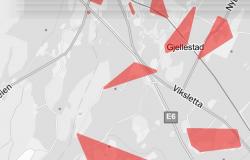The deportation of Mulualem “Mulu” Fikadu, who was 15 years old when he came to Norway, is the first of several Ethiopia cases that have been pending for a long time.
The foster family at Modum despair and say they had hoped for a solution for the longest time.
– Three police officers, a woman and two men, accompanied me on the flight to Ethiopia. I was forced to sign and received $100 in cash. Then they left me here and wished me luck, says Mulualem on the phone from Addis Ababa, a day after he landed.
Read also: Foreign Ministry adjusts travel advice for Ethiopia
Being advised not to go out
– I don’t have a passport or documents, he tells Nettavisen.
– If I am stopped during a check, I will be asked to show identification, he says. The only thing he has to show is a form that says “Passport receipt” and where the Ethiopian authorities have written his name. For now, he has been advised not to go out.
He says that for the time being he can stay with a friend in Addis Ababa.
15 years in Norway
After 15 years in Norway, where Modum in Buskerud has been his home, and after refusing to leave the country voluntarily, the 29-year-old was picked up on Wednesday at the police’s immigration detention center at Trandum and put on the plane that landed on Thursday morning.
Mulualem is being deported because his application for protection in Norway has been refused. Three times he has tried to overturn the decision, but each time he has been refused.
– I have lost family here. I have experienced bad things. There is change here, but it is still not safe here, he says of Ethiopia.
In the Ministry of Foreign Affairs’ travel advice to Norwegians, the situation in Ethiopia is referred to as “fluid and complex”.
Read: Former foreign minister on the Ethiopian affairs: – Worrying
Norwegian family: – We are afraid of him
In Modum, the family that has given Mulualem a home in Norway despairs:
– The air is completely out of the balloon, says Nina Djærff about how she and the rest of the family experienced having to say goodbye and hearing that he was sent out.
– We are afraid of him. His family in Ethiopia is either killed or gone, she says.
The Ethiopian was 15 when he came to Norway in 2009 and 16 when he came to Modum. There he also received three years of upper secondary school.
– I have been both sister and mother to him, says Djærff.
Also read: Samuel has lived here for 15 years – now Norway is throwing him out
UNE on the situation in Ethiopia
Fear of Ethiopian authorities
“Most of the asylum cases from Ethiopia that UNE has dealt with in recent years have been from applicants who fear the authorities in the country. Many say that they have taken part in oppositional activity against the authorities, or that they have close relatives who have been or are active in opposition groups,” writes the Immigration Board (UNE) on its website.
During 2018 there was a positive development in the conditions for the political opposition in Ethiopia, but after 2018 there has been “an increase in ethnically motivated violence and conflicts. During and in the aftermath of unrest, oppositionists, activists and journalists have been exposed to reactions”.
UNE writes that they are now seeing more cases where ethnic affiliation and political activity are the subject.
Ethiopia matters were put on hold
During 2020, the conflict between the Tigray Peoples Liberation Front (TPLF) and the Federal Government of Ethiopia escalated, leading to a war that lasted approximately two years. A ceasefire agreement was signed in November 2022 between the TPLF and the federal authorities.
“From November 2021 to April 2022, the cases from Ethiopia were put on hold due to uncertainty surrounding the political situation and developments in the country. In May 2022, we started dealing with Ethiopia cases again,” writes UNE.
Oromia and Amhara regions
UNE points out that Ethiopia has also been characterized by another central conflict, the armed conflict in parts of the Oromia region. In addition, in the autumn of 2023, an extensive armed conflict broke out in the Amhara region. Militant groups are involved in fighting with federal forces in Amhara, the country’s second most populous region. After tensions escalated, the rebels briefly took control of major cities in August. “They are still active in large parts of the countryside”, writes UNE.
Addis Ababa
“Although there are areas in Ethiopia that are characterized by armed conflict, the situation in several parts of the country is relatively stable and calm. This includes the capital Addis Ababa”, writes UNE.
UNE says they follow the situation in Ethiopia closely and always assess asylum cases on the basis of updated country information.
(Last updated 5 April 2024)
Believes the grounds for refusal are wrong
– We have supported him, but he has also been an incredible resource for our family. One of the first things he did when he got money was buy a new fridge for mum. He was so happy to be able to contribute, says Djærf.
– Yes, he has stayed illegally in Norway, but he was rejected on the basis of the explanation he gave in the first interrogation, as a 15-year-old. Then he was scared and didn’t say much. When he finally dared to tell, I heard about some of what he has experienced, things that exceed what I can imagine, she says.
– He came to Norway from a war situation in his home country as a child. In Ethiopia, he had experienced that his father died and that he was imprisoned together with his mother. We believe the basis for rejecting his application for residence in Norway has been wrong all along, she says.
The family has received support from, among others, NOAS and Amnesty International, and can refer to recommendations from doctors, psychologists and psychiatrists. None of this has come to fruition.
The Norwegian return freeze to Ethiopia was lifted in May 2022. So far this year, there has been no deportation of Ethiopians. Mulualem is the first in this group.
According to the Norwegian Organization for Asylum Seekers (NOAS), there are around 20 Ethiopians detained awaiting forced return.
Has “illegal residence in Norway”
The police’s immigration unit (PU) states that there are a total of around 150 Ethiopian citizens in Norway who have had their application for asylum rejected and who are obliged to leave Norway. They have what is termed “illegal residence in Norway”.
– It is an obligation to leave Norway and return to your home country when your application for a residence permit is rejected. This duty is imposed on the individual himself, including obtaining a travel document in order to be able to return. All applicants are made aware of this in connection with the application process, regardless of the type of application they are applying for. If you choose to ignore the order to return to your home country, the police can take measures to carry out forced return, PU states in an email reply to Nettavisen.
Norway and Ethiopia have a current return agreement from 2019.
Tags: Ethiopia Forced return Norwegian friends forced return afraid
-




